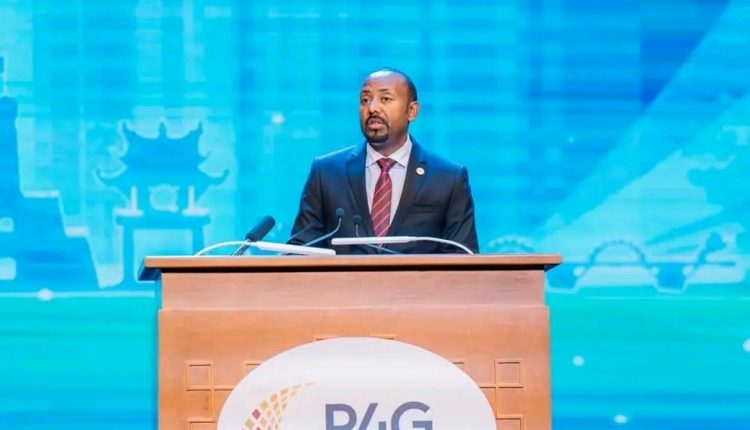PM Abiy says achieving SDGs, fulfilling Paris Agreement targets require reimagined approach to global partnership
Addis Ababa, April 16, 2025 (FMC) – Prime Minister Abiy Ahmed of Ethiopia delivered a powerful address at the 4th Partnership for Green Growth and the Global Goals 2030 (P4G) Summit in Hanoi, where he emphasized the urgent need for a reimagined approach to global partnerships in the fight against climate change.
The summit, held in Vietnam’s capital, brought together over 1,000 delegates from more than 40 countries and international organizations to discuss sustainable growth and climate action.
Prime Minister Abiy outlined Ethiopia’s comprehensive strategy for addressing climate change and achieving the Sustainable Development Goals (SDGs), stressing that global partnerships are key to fulfilling the targets of the Paris Agreement. “Now more than ever, climate action must be backed by tangible, targeted support for countries most vulnerable to the harsh effects of climate change,” he said.
The Prime Minister called for a unified approach that prioritizes practical, inclusive action to support nations enduring the worst consequences of climate change.
Highlighting Ethiopia’s commitment to sustainable development, Prime Minister Abiy noted that the country has set ambitious goals to achieve net-zero emissions and build a climate-resilient economy by 2050, in line with the 2030 Agenda for Sustainable Development and the African Union’s Agenda 2063.
He pointed out that these goals have been embedded in Ethiopia’s national policies and development plans, which are further operationalized through green strategies and initiatives.
A key example of Ethiopia’s climate action efforts, Prime Minister Abiy shared, is the Green Legacy Initiative. Under this initiative, Ethiopia has planted 40 billion seedlings since 2019, making it the world’s largest afforestation program.
The program engages more than 20 million citizens each year, not only expanding forest cover but also improving food and nutrition security through the planting of fruit trees, restoring degraded landscapes, and promoting soil and water conservation. “Our Green Legacy Initiative aims to restore our environment, enhance food security, and promote sustainable agricultural practices,” said the Prime Minister.
In addition to its reforestation efforts, Ethiopia has made significant strides in expanding its renewable energy portfolio. Currently, 98% of Ethiopia’s energy is derived from renewable sources, including hydropower, wind, and solar energy.
Prime Minister Abiy highlighted the Grand Ethiopian Renaissance Dam (GERD) as a symbol of the country’s commitment to sustainable development, noting that the dam provides not only economic and environmental benefits for Ethiopia but also for the entire region. “The GERD stands as a testament to Ethiopia’s commitment to green growth, delivering social, economic, and environmental benefits,” he emphasized.
Ethiopia is also making strides in sustainable transportation, with reforms in the transport sector aimed at reducing carbon emissions.
This includes the introduction of a ban on the import of fuel-based cars and incentives to promote the manufacturing and adoption of electric vehicles.
Additionally, the country is working on developing green and smart cities through the Nationwide Corridor Development Programme, which aims to transform urban and rural areas into sustainable, livable spaces that improve the well-being of citizens.
Addressing the financial challenges of climate action, Prime Minister Abiy reiterated the importance of adequate, predictable, and sustainable climate finance.
He called for increased investment in energy development across Africa, noting that the continent currently receives only 2% of global energy investment, despite being home to vital carbon sinks and ecosystems.
He urged stakeholders to work together to provide the necessary financing and technology to support Africa’s energy development program by 2030.
Prime Minister Abiy also highlighted the need for urgent action to combat biodiversity loss, deforestation, and land degradation.
He emphasized the importance of supporting local and indigenous conservation efforts and ensuring fair benefit-sharing mechanisms. “We must fulfill our financial commitments for biodiversity and establish mechanisms that promote alternative livelihoods and enhance agricultural productivity,” he added.
In conclusion, Prime Minister Abiy reiterated Ethiopia’s commitment to collective action on climate change and sustainable development.
He called for cross-regional cooperation and urged all members of the P4G initiative to set ambitious goals for COP30 in Brazil, ensuring that the global community remains focused on achieving meaningful progress in tackling climate change and advancing sustainable development.

